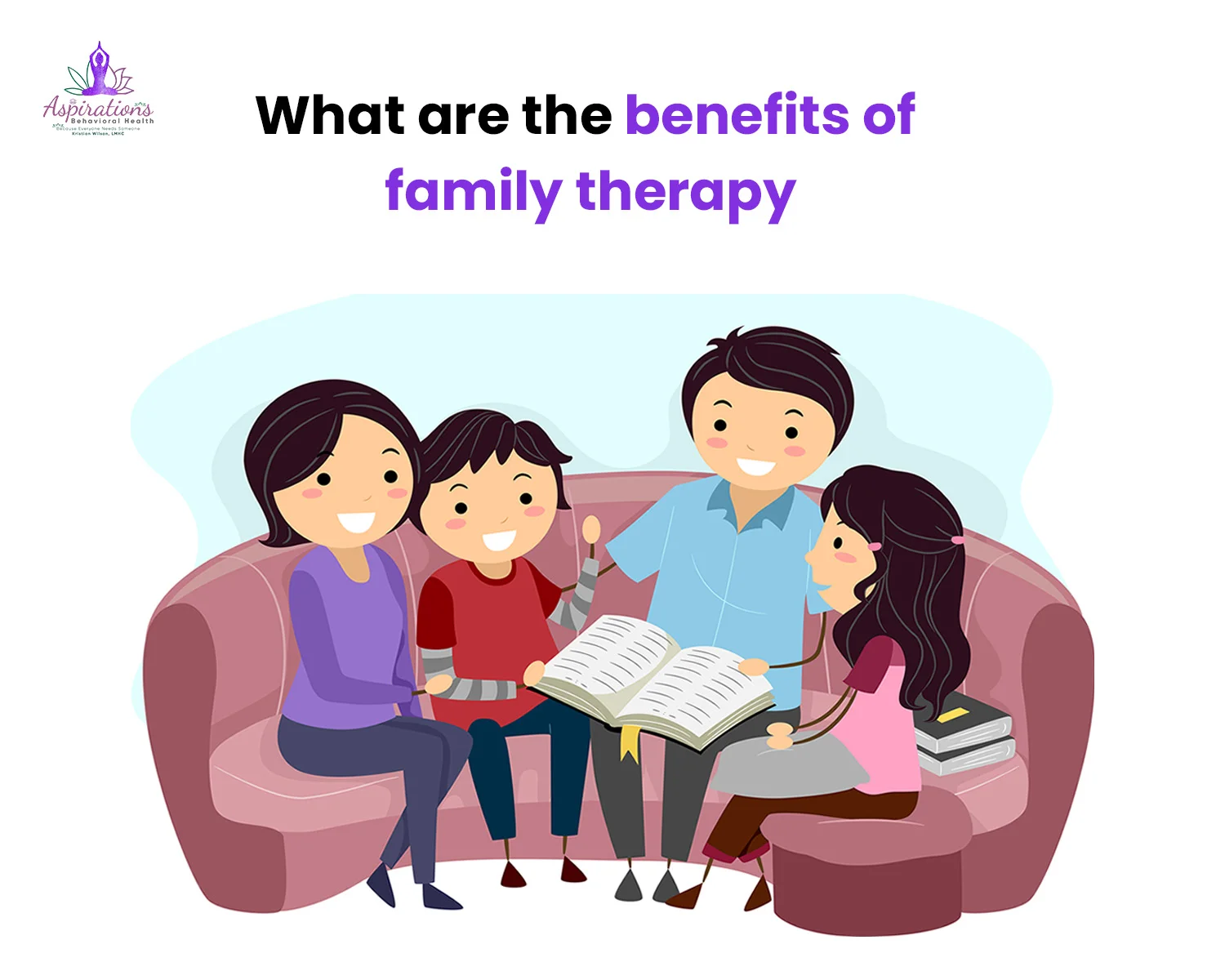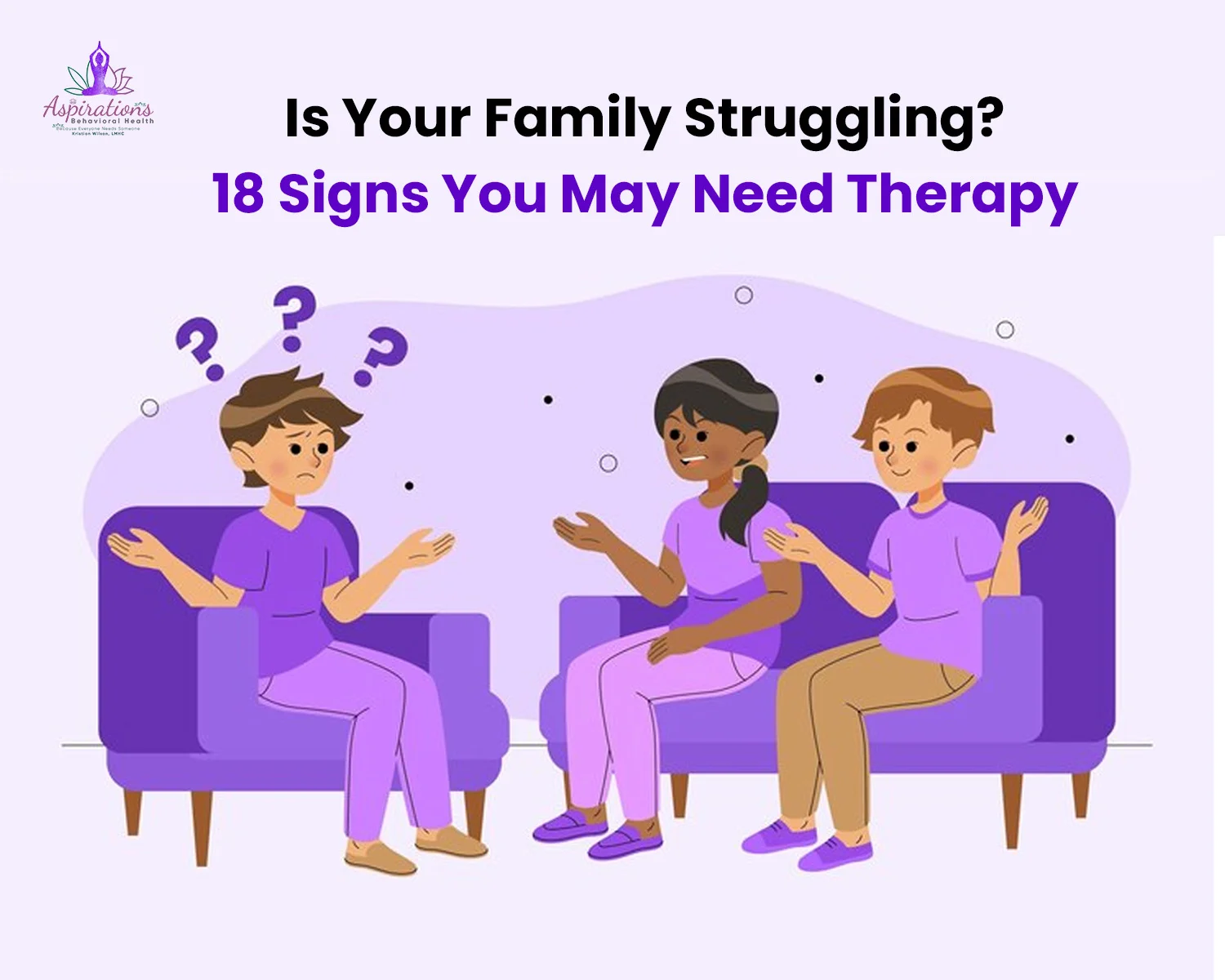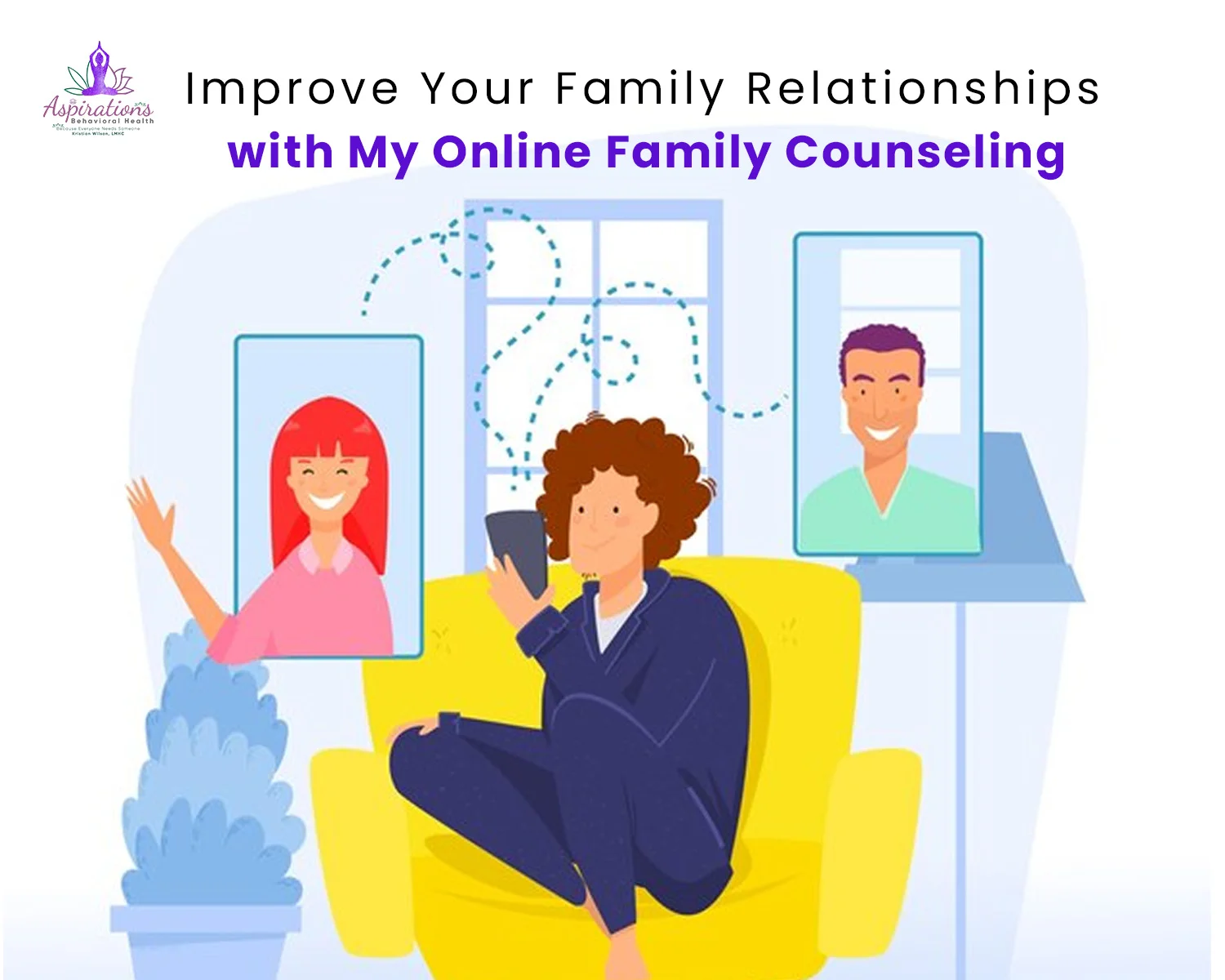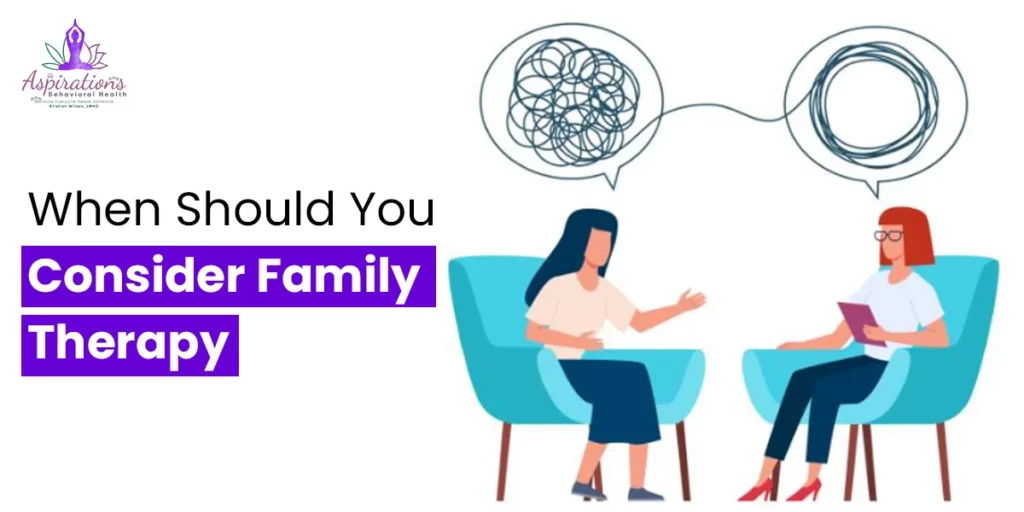Embarking on the journey of family therapy is a transformative decision that can reshape the dynamics of familial bonds. In this guide, readers will navigate the intricate question, “When Should You Consider Family Therapy?” Whether grappling with communication breakdowns, facing escalating conflicts, or encountering major life transitions, this exploration delves into the signs that signal the need for family therapy. Discover the invaluable benefits, gain insights into different therapeutic approaches, and empower your family with the tools to navigate challenges. Join us in unraveling the transformative potential of family therapy and fostering more robust, resilient family connections.
Takeaway
- Recognizing signs of family challenges early allows for proactive intervention, minimizing the impact of issues on relationships and fostering a healthier family dynamic.
- Persistent communication breakdowns can signal a need for family therapy. Addressing these early enhances understanding and strengthens familial bonds.
- Family therapy provides invaluable support during significant life changes, offering a collaborative space for families to navigate transitions and emerge stronger.
- Effective conflict resolution is a cornerstone of family therapy. Learning these skills equips families to handle disagreements constructively, fostering a more harmonious living environment.
What is family therapy?
Step into the realm of family therapy—a space where relationships get a bit of a magic touch-up. Picture it like a journey where things start making more sense, talking becomes a superpower, and the strength of your family gets a real boost.
Family therapy isn’t just about fixing problems; it’s like giving your family a superhero upgrade. It’s all about untangling the tricky bits, getting everyone talking, and creating a stronger bond. In this guide, we’ll casually stroll through family therapy, chatting about how it can make a real difference for your family and when it might be just what you need.
What are the benefits of family therapy?
 Family therapy transforms communication, strengthens bonds, and equips families with conflict-resolution skills. It supports emotional challenges, helps navigate life transitions, and fosters holistic well-being for resilient families.
Family therapy transforms communication, strengthens bonds, and equips families with conflict-resolution skills. It supports emotional challenges, helps navigate life transitions, and fosters holistic well-being for resilient families.
1. Enhanced Communication Skills
Family therapy cultivates improved communication among family members. Through active listening and constructive dialogue, everyone learns to express themselves more openly, fostering understanding and stronger connections.
2. Strengthened Family Bonds
This therapeutic approach focuses on strengthening the bonds within a family unit. By addressing issues collectively, family members develop a more profound sense of connection and solidarity, leading to more resilient relationships.
3. Effective Conflict Resolution
One of the primary benefits of family therapy is equipping families with practical conflict resolution skills. Therapists guide members in navigating disagreements constructively, promoting a healthier and more peaceful living environment.
4. Support for Behavioral and Emotional Challenges
Family therapy provides crucial support when dealing with behavioral or emotional challenges in children or teenagers. By addressing these issues as a family, everyone becomes part of the solution, contributing to the overall well-being of each family member.
5. Coping with Major Life Transitions
During significant life changes, like relocations or career shifts, family therapy offers a supportive space to navigate transitions collectively. This helps families adapt more smoothly, minimizing stress and fostering resilience.
6. Holistic Family Well-being
Beyond symptom relief, family therapy takes a holistic approach to well-being. It focuses on building overall family resilience, positively impacting emotional health, and providing tools to navigate future challenges successfully.
Who can benefit from family therapy?
Family therapy can help anyone who wants to solve problems more successfully and build more significant relationships within their family. Family therapy is your road map to forging strong ties and promoting a better, happier family life, whether resolving problems, adjusting to life changes, or just trying for a more harmonious home. Investigate the potentially life-changing benefits of family therapy and support your family’s effort to improve understanding and communication.
Is Your Family Struggling? 18 Signs You May Need Therapy
 If your family faces challenges, consider therapy. Watch for signs like constant arguments, withdrawal, or behavioral changes. Family therapy can provide a supportive space to address these issues, fostering understanding and promoting healthier relationships. Take the first step towards a happier family life. Here, we discuss them in detail.
If your family faces challenges, consider therapy. Watch for signs like constant arguments, withdrawal, or behavioral changes. Family therapy can provide a supportive space to address these issues, fostering understanding and promoting healthier relationships. Take the first step towards a happier family life. Here, we discuss them in detail.
Family issues
- Frequent arguments disrupting family harmony may indicate underlying issues that family therapy can address, promoting healthier communication and conflict resolution.
- Family members withdrawing or isolating themselves may signal emotional struggles. Family therapy creates a supportive environment to explore and address these feelings.
- Difficulty expressing thoughts or feelings can lead to communication breakdowns. Family therapy offers tools to enhance communication, fostering understanding and connection.
- Sudden changes in behavior, such as irritability or mood swings, may suggest deeper concerns. Family therapy provides a space to explore and address these changes collaboratively.
- When family issues start affecting daily life, from work to relationships, seeking therapy becomes essential. Family therapy can assist in navigating and resolving these challenges.
2. Marriage problems
- Are you struggling to communicate effectively with your spouse? If constant misunderstandings or arguments prevail, it may be a sign that seeking marriage therapy could help restore healthy dialogue.
- A decline in intimacy or emotional connection can indicate marriage problems. Family therapy provides a safe space to address underlying issues affecting emotional bonds.
- Frequent and escalating conflicts within the marriage may signal a need for therapy. Professional intervention can equip couples with practical conflict-resolution skills.
- Lingering resentment can poison a marriage. Family therapy allows couples to explore and address unresolved issues, fostering forgiveness and understanding.
3. Child and adolescent issues
- Notice abrupt shifts in your child’s behavior, like withdrawal or aggression. Family therapy addresses these changes, fostering a supportive environment for understanding and resolution.
- If your child is facing difficulties at school, family therapy can help identify underlying issues and implement strategies for academic success.
- Family therapy improves communication within the family, allowing your child to express emotions and concerns effectively fostering a more supportive environment.
- If your child struggles with peer relationships, family therapy can provide tools to navigate social interactions and build stronger, more positive connections.
- Addressing emotional challenges in a family setting helps your child feel supported and understood, promoting overall emotional well-being through therapeutic interventions.
4. Anxiety
- Individuals experiencing anxiety within the family may exhibit constant worry, leading to heightened tension in everyday interactions.
- Anxiety can contribute to communication breakdowns, making it challenging for family members to express their thoughts and feelings openly.
- Noticeable physical symptoms like restlessness, fatigue, or muscle tension may manifest in family members struggling with anxiety.
- Anxiety can hinder daily functioning, affecting work, school, and relationships within the family, leading to a need for therapeutic intervention.
- Family members dealing with anxiety may resort to avoidance behavior, withdrawing from social activities or family events, indicating a potential need for family therapy.
5. Depression
- Notice prolonged sadness or hopelessness in a family member, affecting daily life and relationships. Family therapy can address underlying issues contributing to depression.
- Identify withdrawal from social activities or isolation. Family therapy offers a space to explore the root causes, fostering open communication and support.
- Recognize a diminished interest in previously enjoyed activities. Family therapy can explore these shifts, encouraging family members to express concerns and regain a sense of joy and connection.
- Understand how depression influences family dynamics. Family therapy not only supports the individual experiencing depression but also helps the entire family navigate and respond to these challenges together.
6. Low self-esteem
- Individuals, especially children or teens, may exhibit a marked decrease in self-confidence, impacting their ability to engage socially and academically.
- Pay attention to persistent negative self-talk or self-deprecating comments indicating feelings of inadequacy or worthlessness.
- Low self-esteem often leads to social withdrawal. If a family member consistently avoids social situations or isolates themselves, it could be a sign of underlying self-esteem issues.
- Keep an eye on academic performance. Low self-esteem can manifest as a decline in grades or a lack of interest in school-related activities.
- Individuals with low self-esteem may constantly need external validation or approval, relying on others to affirm their worth and competence.
7. Life transitions
- Family therapy assists in adapting to significant life transitions such as relocations, job changes, or additions to the family, fostering resilience and minimizing stress.
- Families facing life transitions often experience heightened stress. Therapy provides coping strategies, promoting emotional well-being during uncertain times.
- Therapy facilitates open communication, helping family members express concerns and expectations, ensuring a smoother transition, and reducing potential conflicts.
- By addressing life transitions collectively, families strengthen their resilience. Therapy emphasizes mutual support, encouraging the family to navigate changes as a united front.
- Family therapy aids in positive adaptation to new circumstances, fostering a sense of stability and mutual understanding as the family navigates the challenges associated with life transitions.
8. Relationship concerns
- If open communication becomes a challenge, with family members feeling unheard or misunderstood, family therapy can address communication barriers and enhance understanding.
- Recognize a diminished emotional connection among family members, with feelings of isolation or disengagement, highlighting the need for therapeutic interventions to rebuild emotional bonds.
- Persistent conflicts that remain unresolved may signify deeper relationship issues. Family therapy offers a structured environment to explore and address the root causes of conflicts.
- When family members express a sense of disconnection or alienation, family therapy can provide a platform to identify and mend relational gaps, fostering a stronger sense of togetherness.
9. Gay, lesbian, and bisexual concerns
- Family therapy provides a safe environment for gay, lesbian, and bisexual family members to explore and express their sexual identity without judgment, fostering understanding and acceptance.
- Therapists assist families in addressing potential challenges and reactions related to sexual orientation, promoting open communication and empathy among family members.
- Through family therapy, the focus is on promoting acceptance and understanding, creating a space where everyone feels supported and valued, irrespective of their sexual orientation.
- Family therapy encourages families to unite against discrimination and biases, fostering a collective approach to overcome challenges and build a supportive, inclusive family unit.
10. Discrimination
- Experiencing discrimination can profoundly affect family dynamics, leading to strained relationships and emotional distress among members, influencing overall well-being.
- Family members may isolate themselves due to discrimination, creating emotional distance and hindering open communication within the family unit.
- Discrimination can lead to heightened conflicts within the family, as frustrations and tensions may escalate, causing further strain on relationships.
- Discrimination takes an emotional toll on individuals and their families, contributing to stress and anxiety and potentially affecting mental health.
- Family therapy provides a safe space to address the impact of discrimination, fostering resilience and understanding and promoting healthier coping mechanisms for the entire family.
11. Loss and grieving
- Unaddressed loss can strain family relationships, hinder open communication, cause emotional distance, and impact overall family well-being.
- Grieving family members may exhibit behavioral changes, such as withdrawal or irritability, affecting the family’s daily interactions and harmony.
- Grief can lead to difficulty expressing emotions. Family therapy provides a space to navigate these challenges, fostering effective communication and mutual support.
- Children and teens may struggle with grief differently. Family therapy helps address their unique needs, ensuring a supportive environment during grieving.
- Family therapy aids in building resilience collectively, guiding the family through the grieving process, and fostering understanding, strength, and emotional well-being.
12. Eating disorders
- Observe drastic changes in eating habits, such as binge eating or severe restriction.
- Look for secretive behaviors around food or a distorted body image, potential signs of an eating disorder.
- Notice weight fluctuations or unexplained physical symptoms.
- Identify nutritional deficiencies affecting overall health, indicating the need for intervention.
- Pay attention to emotional distress related to body image or food.
- Recognize the emotional toll an eating disorder takes on both the individual and the family, necessitating therapeutic support.
Addressing these signs through family therapy can provide a comprehensive approach to understanding and overcoming eating disorders, promoting holistic well-being.
13. Health-related issues
- Persistent health issues can strain family dynamics, causing stress and emotional turmoil. Family therapy addresses the emotional impact, providing coping strategies for the entire family.
- Health challenges may lead to breakdowns in communication, with family members struggling to express concerns or understand each other’s needs.
- Family therapy offers a platform to collectively navigate treatment decisions, fostering a united front and shared understanding of health-related challenges.
- It establishes the family as a vital emotional support system, helping each member cope with the emotional toll of health-related issues.
- Family therapy focuses on building resilience, providing tools to adapt to health-related changes, and fostering a positive environment that contributes to overall family well-being.
14. Sexual harassment
- Enduring unwelcome advances or inappropriate comments within the family dynamic can create emotional distress and disrupt trust.
- Sexual harassment may lead to anxiety, depression, or other mental health challenges, affecting the overall well-being of family members.
- Harassment can result in breakdowns in communication, hindering healthy interactions and creating a toxic family environment.
- Recognizing the signs of sexual harassment necessitates professional intervention, and family therapy can provide a safe space to address and overcome these issues.
- Through family therapy, individuals can work towards creating a supportive environment, fostering open communication, and empowering change in the face of sexual harassment.
15. Alcohol abuse
- Recognize patterns of frequent, excessive alcohol consumption within the family, indicating a potential need for intervention and support through family therapy.
- Excessive drinking may strain relationships, leading to conflicts and communication breakdowns, highlighting the importance of addressing alcohol abuse in a therapeutic setting.
- Observe behavioral shifts, such as irritability or mood swings, linked to alcohol abuse, emphasizing the need for family therapy to address these changes collectively.
- Family therapy provides a space to address the impact of alcohol abuse on family dynamics, fostering effective communication and resolution strategies for healthier relationships.
- Acknowledge the need for professional intervention. Family therapy offers a structured and supportive environment to address alcohol-related issues, promoting understanding and recovery within the family unit.
16. Domestic violence
- Individuals experiencing domestic violence may exhibit visible physical injuries, including bruises or marks, signaling the urgent need for intervention and therapeutic support.
- Victims often display heightened emotional distress, such as anxiety, depression, or extreme mood swings, underscoring the critical role of therapy in addressing the psychological impact.
- Domestic violence can lead to social isolation and withdrawal from friends and family. Family therapy becomes crucial in rebuilding support networks and fostering a sense of connection.
- Witnessing domestic violence can profoundly impact children, manifesting in behavioral changes. Family therapy is essential in addressing and mitigating the lasting effects on children’s well-being.
- Domestic violence often results in a breakdown of communication within the family. Family therapy intervenes, facilitating open dialogues to address the root causes and rebuild healthy communication patterns.
17. Substance abuse
- Recognize increased substance use within the family, including alcohol or drugs, as a red flag.
- Note abrupt changes in behavior, such as secrecy or volatility, signaling potential substance-related issues in family members.
- Substance abuse often strains family relationships, leading to conflicts, mistrust, and breakdowns in communication.
- Look out for neglect of responsibilities, like work or childcare, as a consequence of substance abuse, indicating a need for intervention.
- When substance abuse disrupts family life, consider family therapy as a supportive intervention to address the root causes and foster recovery.
18. Conflict resolution
- Unresolved conflicts leading to frequent arguments can strain family bonds, indicating a need for therapy to address communication breakdowns and promote resolution.
- Family members withdrawing emotionally may signify underlying issues. Family therapy helps create a safe space for expression, fostering connection and understanding.
- Noticeable shifts in behavior, such as mood swings or sudden isolation, may signal deeper concerns. Family therapy can address these changes collaboratively for a healthier family dynamic.
- Behavioral issues or academic struggles in children may indicate family challenges. Family therapy can provide support, helping children and parents navigate difficulties together.
- The inability to resolve conflicts independently may suggest a need for intervention. Family therapy equips families with practical conflict resolution skills, promoting a more harmonious living environment.
Improve Your Family Relationships with My Online Family Counseling
 Discover a transformative journey to stronger family bonds with our Online Family Counseling services at Aspirations Health. Our experienced family therapists provide a supportive and confidential space for your family to navigate challenges, enhance communication, and foster resilience. With flexible online sessions, you can prioritize your family’s well-being from the comfort of your home. Uncover the benefits of collaborative goal-setting, effective conflict resolution, and personalized treatment plans to meet your family’s unique needs. Take the first step toward a harmonious family life—visit Aspirations Health for expert online family counseling that empowers your journey to a healthier and happier family dynamic.
Discover a transformative journey to stronger family bonds with our Online Family Counseling services at Aspirations Health. Our experienced family therapists provide a supportive and confidential space for your family to navigate challenges, enhance communication, and foster resilience. With flexible online sessions, you can prioritize your family’s well-being from the comfort of your home. Uncover the benefits of collaborative goal-setting, effective conflict resolution, and personalized treatment plans to meet your family’s unique needs. Take the first step toward a harmonious family life—visit Aspirations Health for expert online family counseling that empowers your journey to a healthier and happier family dynamic.
Aspirations Behavioral Health offers a wide range of services, including:
Online Individual Consultation And Coaching
Online Child And Adolescent Therapy
Conclusion
In conclusion, family therapy is a transformative compass, guiding families toward stronger bonds and improved well-being. By recognizing the signs early and embracing proactive intervention, families can overcome challenges, foster effective communication, and navigate life transitions with resilience. The emphasis on conflict resolution skills ensures a harmonious living environment, while the holistic approach promotes enduring family strength. As we explore the transformative potential of family therapy, remember that seeking support is not just an option but a powerful choice to nurture a happier, healthier, and more connected family life.



